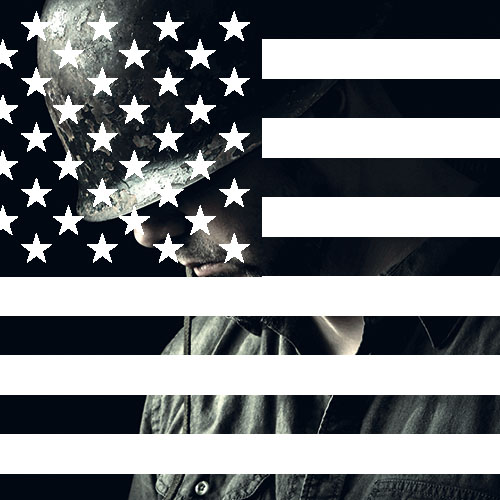Bogus heroes crave the glory that comes with military service — but their lies diminish the very real impact of war on true fighters.
Stolen Valor
 To his friends, co-workers and loved ones, Richard Meleski was a war hero. To hear him tell it, his bravery, strength and selflessness were routinely tested over his six years as a member of the Navy’s vaunted SEAL Team Six. Perhaps his most harrowing mission came in 1984, when Meleski experienced 18 tortuous hours in Beirut, Lebanon.
To his friends, co-workers and loved ones, Richard Meleski was a war hero. To hear him tell it, his bravery, strength and selflessness were routinely tested over his six years as a member of the Navy’s vaunted SEAL Team Six. Perhaps his most harrowing mission came in 1984, when Meleski experienced 18 tortuous hours in Beirut, Lebanon.
The Middle Eastern country was then in the midst of a bloody civil war. Complicating this conflict were proxy fighters from numerous countries, including Hezbollah forces backed by Iran. In September 1984, a suicide car bomber associated with Hezbollah attacked the U.S. Embassy in Beirut, the second such attack in as many years. Twenty-four people were killed.
U.S. forces were deployed to the region with orders to protect American assets and put a lid on the violence. Shortly after Meleski and a string of fellow SEALs touched down, they were captured, tortured and, in the case of one soldier, killed by an unidentified faction of belligerents. As part of his abuse, Meleski’s hand was smashed with a hammer.
In one brief moment during his captivity, Meleski saw an opportunity for him and three other SEALs to escape out a window and took it. This maneuver brought freedom, and later, a Silver Star. But Meleski fell hard from the window, incurring a traumatic brain injury so intense he couldn’t speak for months.
When he retired from the military in 1986, Meleski had many scrapes and bruises that required attention, including hearing loss, back injuries and PTSD.
In 2010, Meleski sought help from the Department of Veterans Affairs (VA). Due to his status as a former Prisoner of War, he was put in the VA’s Priority Group 3, which entitled him to swifter attention than other former troops. Decades on from his service, he continued to tell his war stories to anyone who’d listen. On his Facebook page, he also inveighed against the unpatriotic: “If you haven’t risked coming home under the flag, don’t you dare disrespect it.”
Yet Meleski had himself never undertaken these risks or served in the military at all. For much of the time he claimed to have been a globe-trotting Cold Warrior, he’d actually been serving a prison sentence in New Jersey.
The VA and federal prosecutors sniffed out Meleski’s fraud, but it took nearly a decade. Over that period, he received VA health care and benefits checks worth in excess of $300,000.
During his trial, which concluded in 2021, U.S. District Judge Timothy J. Savage railed against Meleski, 60, as a “man who lived years in a fantasy.” Clearly, he had a warped need for public acclaim. Meleski’s incarceration in Jersey, after all, stemmed from a similarly mind-bending scheme of faux heroism, one where he quietly set homes ablaze, then helped extinguish them as a member of his town’s volunteer fire department.
“I guess I wanted to be someone who I wasn’t,” he acknowledged in court.
After pleading guilty to numerous charges, including faking a military career, Meleski was sentenced to more than three years in prison.
While wild, Meleski’s tale is far from an aberration. For as long as America has waged war, some citizens have been falsely identifying as fighters. But in 2005, Congress increased the consequences of these lies by ratifying the Stolen Valor Act, which makes it “illegal to fraudulently wear medals, embellish rank, or make false claims of service in order to obtain money or some other tangible benefit.”
They just want the recognition. They don’t want the pain. They don’t want the nightmares. They just want to be somebody’s hero, and it doesn’t work that way.
Yet despite serious criminal and reputational deterrents, stolen valor persists.
These schemes have repeatedly emerged in the political arena, where military service not only confers trust, but protection from attack. And even among those who have actually served, there have been unnecessary embellishments.
One of history’s most egregious cases involved Utah Republican Douglas Stringfellow, who won a 1952 congressional seat by concocting a story strikingly similar to Meleski’s. Specifically, the Army veteran billed himself as a World War II spy, who parachuted into Germany, was captured, tortured and became a paraplegic — none of which was true.
More recently, Sen. Richard Blumenthal, a Connecticut Democrat who said he’d “served in Vietnam,” actually secured numerous deferments and served stateside in the Marine Corps Reserve during the war, and Tom Cotton, a Republican senator from Arkansas, claimed to be an Army Ranger, when he merely attended the Army’s two-month Ranger School. This behavior has also trickled down into local politics, including a bizarre 2020 Texas sheriff’s race where both candidates concocted fake military stories.
These sorts of stories appear mostly motivated out of a selfish thirst for power. Others include elements of greed, but also seem symptomatic of a deep American discontent with day-to-day life.
Some have stolen valor to buy BMWs or fancy homes. Other run more modest schemes in hopes of securing basic stability. While Meleski clearly enjoyed the respect afforded through his phony veteran status, his assumed valor also gave the forklift driver free health care and a supplemental income.
In a similar case, Kristopher Voyles was indicted last year for falsely claiming to have served. In 2018, Voyles, now 31, ripped off the identity of a real veteran to secure care at a Georgia VA hospital. He later pulled off the same stunt in Tennessee, where he was provided with more than $20,000 worth of psychiatric care.
In June, Voyles was sentenced to more than two years in federal prison. While egregious, his case stemmed mostly out of medical necessity.
A less tangible disorder shows up in the cases of those with a warped need to feel heroic. For decades, and particularly in the post-9/11 era, men are overloaded with militaristic and hypermasculine imagery. These messages make many feel subpar and spur them to buy everything from big guns to tactical diaper bags.
This mindset seemed to have infected Shane Ladner, a cop and former veteran, who in 2018 lied about being injured in a top-secret military mission in Central America to secure a Purple Heart license plate for his Ford F-150. Even the late marksman Chris Kyle, of American Sniper fame, felt the need to falsely bolster his credibility. Despite a legendary military record, Kyle inflated the number of Bronze and Silver Stars he’d received.
These cases offer urgent evidence that the American dream is slipping away, while masculinity is becoming poisoned by militarism. This trend also diminishes the very real and painful impact of war on real fighters.
This was pointed out by Mary Schantag, chairwoman of the P.O.W. Network, who has unmasked hundreds of fake veterans over the years.
“You get these guys that want that status,” she told the military news site Task & Purpose in 2018. “But they didn’t earn it. They don’t have the nightmares these other guys wake up with because of what they went through. They just want the recognition. They don’t want the pain. They don’t want the nightmares. They just want to be somebody’s hero, and it doesn’t work that way.”
Sometimes people completely and totally suck, y’know? If you suspect someone of this sort of abuse, you can try to do something about it. Oddly, people can lie all they want to without committing a crime … but they cannot attempt to profit from that lie. (We have definitely said enough on that subject for now.)






















